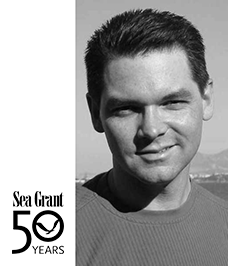As the National Sea Grant College Program celebrates its 50th anniversary, we take a look back at how our program has supported education through graduate fellowships.
In month-long this series, we explore what former California Sea Grant State Fellows have been up to since their fellowship.
 A California Sea Grant State Fellow with the Delta Stewardship Council (formerly known as the CALFED Bay-Delta Program) in 2002, Edward Salinas earned his doctorate degree in pharmacology and toxicology from the University of California, Davis, in May 2004.
A California Sea Grant State Fellow with the Delta Stewardship Council (formerly known as the CALFED Bay-Delta Program) in 2002, Edward Salinas earned his doctorate degree in pharmacology and toxicology from the University of California, Davis, in May 2004.
During his fellowship, Salinas is organized a workshop titled “Contaminant Stressors in the Bay-Delta Watershed,” which focused on the effects of endocrine-disrupting contaminants in the San Francisco Bay-Delta ecosystem. He spent a lot of time reading scientific literature on what was already known about the effects of contaminants–heavy metals, pesticides, by-products of hormone supplements–on marine and human health.
Salinas said he discovered the challenges and rewards of approaching science – not as a laboratory exercise – but as a part of the decision-making process for managing resources as vital as drinking water for more than 25 million Californians.
“My experiences as a fellow were really different than graduate work,” said Salinas, whose doctoral thesis examined the effects of pulp-mill effluent on sea urchin reproduction. His research led to the discovery of a compound that prevents sea urchin sperm from fertilizing urchin eggs–a sort of molecular condom. The compound was tested in primates and has since been patented for use as a human contraceptive. “[As a fellow,] I was asking, ‘What are the big questions? Who is out there looking for answers?’”
After his fellowship, Salinas joined Pacific EcoRisk, an environmental consulting firm in Martinez, Calif.
As a special projects director, Salinas oversaw tests for determining the toxicity of wastewater from businesses with National Pollutant Discharge Elimination System permits. The tests were mandatory for businesses that discharge into streams, rivers, lakes or coastal waters. He also led the company’s research on the effects of mercury and endocrine disrupters on aquatic organisms.
“I’ve gone from academia to government to private industry,” Salinas said, referring to his time as a graduate student, state fellow and industry consultant. “Each one is unique. As a state fellow, I was looking at things from a very broad perspective. It has been invaluable for broadening my horizons.”
Salinas is currently an ecotoxicologist at BASF in Germany.
Originally published June 2004



